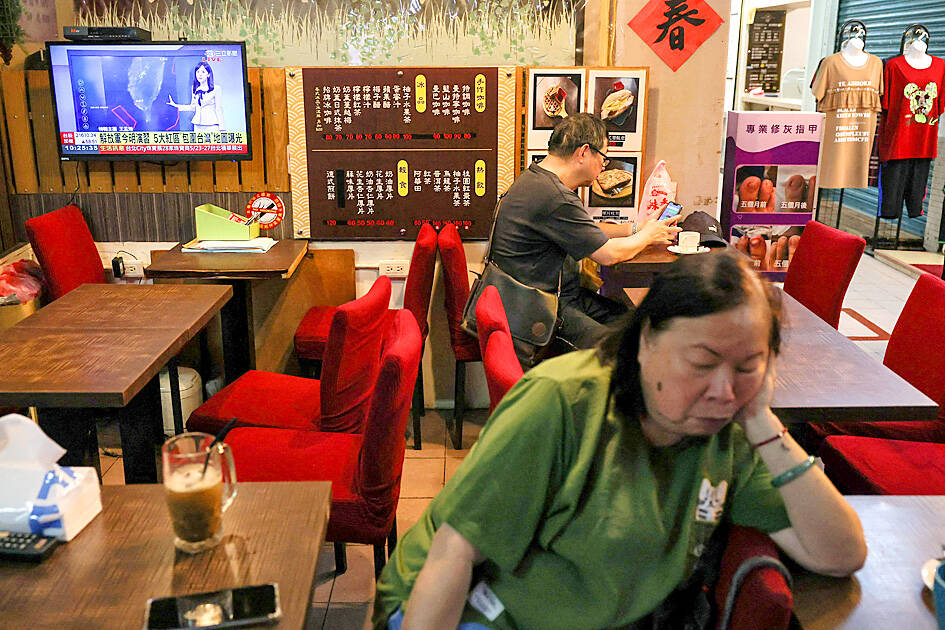As China staged a second day of “punishment” drills yesterday in response to President William Lai’s (賴清德) inauguration, some residents said they would carry on with their normal lives despite Beijing’s pressure.
China staged mock missile strikes in waters east of Taiwan and dispatched fighter jets carrying live missiles, Chinese state media reported, as Beijing tested its ability to “seize power” and control key areas of Taiwan.
However, in the nation of 23 million people, life has continued as normal with no overt sign of worry, as Taiwanese have gotten used to decades of living with Chinese threats.

Photo: Ann Wang, REUTERS
China’s military exercises “don’t really affect our daily lives. We still have to work to make money,” said Chen Sian-en, a tire repair shop owner in Kaohsiung.
“From childhood to adulthood, it means that we’ve gotten used to [China’s] threats,” said Chen, 66, adding that the drills were “some kind of intimidation tactic” and a “show of force” from Beijing to Taiwan’s new president.
“They’ve talked about it so many times, but there hasn’t been any real action. If they wanted to take over Taiwan, they would have done it already,” Chen said.
While Taiwanese media have covered the drills, a lot of the focus has instead been on continuing protests against efforts by the opposition to push legislative reforms, and occasional fighting by lawmakers on the floor of the chamber.
“I feel no reason to be scared,” Taipei taxi driver Chuang Jun-sung said. “If China really attacks Taiwan, there’s nothing Taiwan can do but deal with it, but we should still have the guts to fire our missiles back at them.”
The drills are being conducted all around Taiwan, as well as areas close to Kinmen County, and Dongyin (東引) and Wuchiu (烏坵) islands in Lienchiang County near the Chinese coast.
Kinmen resident Tim Chang, 52, said that Beijing has been threatening war for decades.
“If war is bound to happen, if they planned to attack, they would have struck 20, 30 years ago,” he said.
Taiwan’s benchmark index is at a historic high, scarcely impacted by China’s drills. The market closed down 0.2 percent yesterday; on Thursday, the day the drills began, it closed up 0.3 percent.
The stock of Taiwan Semiconductor Manufacturing Co, the world’s largest contract chipmaker, is also at a historic peak.
“The drills will have a short-term psychological impact, but won’t reverse the long-term upward trend of Taiwan stocks,” Mega International Investment Services vice president Alex Huang (黃國偉) said.
Vasu Menon, managing director of investment strategy at OCBC in Singapore, said that investors were not expecting any dramatic escalation in tensions.
“China’s military has over the past few years carried out regular activities near Taiwan, making investors less sensitive to such drills,” he added.
Still, Kaohsiung resident Angeline Liao said that she was personally “very worried” about the drills.
“If, hypothetically, there were some military [war] activities today, I think I would be the first one to wave the white flag,” the 36-year-old insurance agent said.

Three Taiwanese airlines have prohibited passengers from packing Bluetooth earbuds and their charger cases in checked luggage. EVA Air and Uni Air said that Bluetooth earbuds and charger cases are categorized as portable electronic devices, which should be switched off if they are placed in checked luggage based on international aviation safety regulations. They must not be in standby or sleep mode. However, as charging would continue when earbuds are placed in the charger cases, which would contravene international aviation regulations, their cases must be carried as hand luggage, they said. Tigerair Taiwan said that earbud charger cases are equipped

Foreign travelers entering Taiwan on a short layover via Taiwan Taoyuan International Airport are receiving NT$600 gift vouchers from yesterday, the Tourism Administration said, adding that it hopes the incentive would boost tourism consumption at the airport. The program, which allows travelers holding non-Taiwan passports who enter the country during a layover of up to 24 hours to claim a voucher, aims to promote attractions at the airport, the agency said in a statement on Friday. To participate, travelers must sign up on the campaign Web site, the agency said. They can then present their passport and boarding pass for their connecting international

UNILATERAL MOVES: Officials have raised concerns that Beijing could try to exert economic control over Kinmen in a key development plan next year The Civil Aviation Administration (CAA) yesterday said that China has so far failed to provide any information about a new airport expected to open next year that is less than 10km from a Taiwanese airport, raising flight safety concerns. Xiamen Xiangan International Airport is only about 3km at its closest point from the islands in Kinmen County — the scene of on-off fighting during the Cold War — and construction work can be seen and heard clearly from the Taiwan side. In a written statement sent to Reuters, the CAA said that airports close to each other need detailed advanced

Tropical Storm Fung-Wong would likely strengthen into a typhoon later today as it continues moving westward across the Pacific before heading in Taiwan’s direction next week, the Central Weather Administration (CWA) said. As of 8am, Fung-Wong was about 2,190km east-southeast of Cape Oluanpi (鵝鑾鼻), Taiwan’s southernmost point, moving westward at 25kph and possibly accelerating to 31kph, CWA data showed. The tropical storm is currently over waters east of the Philippines and still far from Taiwan, CWA forecaster Tseng Chao-cheng (曾昭誠) said, adding that it could likely strengthen into a typhoon later in the day. It is forecast to reach the South China Sea